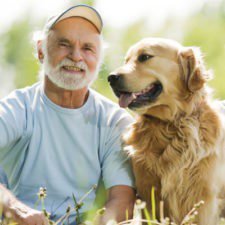Here at Pendleton, we love big dogs. These gentle giants often have huge hearts to go with their big bodies. However, they do have some specific care needs. These guys are also at risk from certain health problems. Hip dysplasia is one issue that is very common in large dogs. An Anderson, IN vet discusses this painful condition below.
Nutrition
Proper nutrition is crucial here. Excess weight will put even more strain on Fido’s bones and joints. This is especially crucial when your pet is a puppy. Big dogs grow very, very fast, so any nutritional issues during this stage can lead to big trouble down the road. Ask your vet for specific advice, including supplements and serving sizes.
Activity
Making sure your furry friend is getting the right type and amount of exercise is also important. This will help prevent obesity and keep Fido’s bones and muscles strong. Swimming is a good option, assuming your pet likes it. Walks are also fine. Don’t encourage your pooch to jump or stand on his back legs too much.
Symptoms
You’ll want to keep an eye out for warning signs. Some common ones are limping, reduced mobility, lack of interest in play, and trouble getting up or walking. Fido may also seem sore. He may lick or bite himself, or flinch when touched.
Comfort
Make sure your canine pal has a comfy bed. Orthopedic beds are great, as they offer extra support! Bone/joint conditions often flare up in damp, chilly weather, so keep Fido warm and dry.
Veterinary Care
We strongly recommend having large pups screened for hip dysplasia regularly. This condition can’t be cured, but there are treatments that can help, such as laser therapy. Early detection is also very beneficial.
Traction
Fall can be very dangerous for large dogs, especially those with hip dysplasia. If you have floors, you may want to set runners or area rugs out to help Fido get better traction.
Doggy Luxuries
Many of the things that people use to treat pain and stiffness will also help Fido feel better. Heating pads, warm compresses, hot water bottles, and massage therapy can all help soothe your furry friend, and reduce his pain. Ask your vet for more information.
Do you know or suspect that your dog has hip dysplasia? Contact us, your local Anderson, IN vet clinic, today. We’re here to help!








